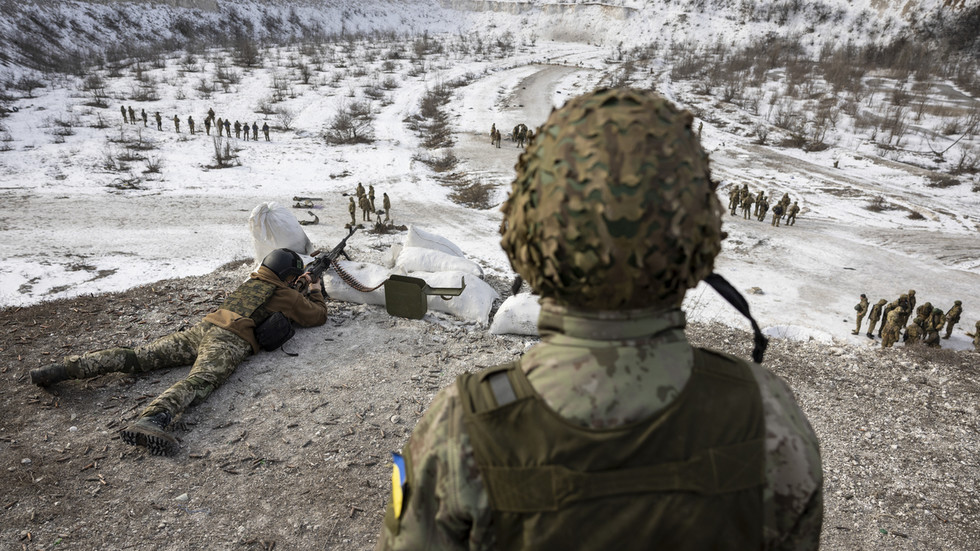
The release looks like an attempt to distract Russia’s attention from what’s really going on
By ‘Military Chronicle’ Telegram channel
FILE PHOTO. Ukrainian Army replacement troops go through combat training on February 24, 2023 in the Donbas region of eastern Ukraine. © John Moore/Getty Images
On Friday, photos appeared of a document allegedly containing details on a planned imminent Ukrainian offensive on territories controlled by Russia. The ‘leak’ coincided with suggestions that the NATO Defender 2023 exercises – planned for the end of this month – could be a cover for an operation to supply and support Ukrainian units. However, upon closer examination, doubts arise concerning the document’s authenticity.
When did it appear?
The supposed secret plans to support an offensive by Kiev’s forces hit the internet the day before Anthony Blinken made a statement on the subject. The US Secretary of State said the operation will begin “within a few weeks.”
What information does it contain?
There hasn’t been a leak of this nature since Moscow’s military campaign in Ukraine began, over 13 months ago. It is noteworthy that the published plans contain not only a schedule for supplying Ukrainian units with NATO weapons and ammunition, but also information about the structure of the brigades and battalions allegedly preparing for the offensive.
The document, dated March 1, says Kiev’s brigades need 253 tanks, more than 380 infantry fighting vehicles and APCs, 480 vehicles, 147 artillery pieces, and 571 HMMWV armored vehicles to carry out the offensive.
Read more
Which information is most suspect?
The probable locations of Russian units, indicated on the combat map in red, appear to have been collected from open sources. Several pro-Kiev resources that track military operations contain almost identical information.
Also, the ratios of killed and wounded for the Ukrainian and Russian Armed Forces which initially appeared in these ‘secret plans’ have since been changed. When first posted, the losses for the Ukrainian side were underestimated at about 16,500 –17,000 people. Then (probably to be more realistic), they increased almost fivefold, up to 65,000 – 75,000. At the same time, the numbers given for Russia’s purported losses of vehicles and equipment coincide with data published by Kiev’s Ministry of Defense.
What else is wrong with the published AFU offensive plans?
The blatant falsification of data on the readiness of Ukrainian military formations catches the eye. The document states that, of the nine supposedly to be trained up to US and NATO standards by March 31 and April 30, five of Kiev’s brigades have had zero training: these are the 82nd Airborne, the 32nd, 117th, and 118th Territorial Defense, as well as the 21st separate mechanized.
Even if only two or three companies in these brigades were trained, and self-preparation wasn’t completed, their level of training couldn’t be zero. At the same time, the highest percentage of readiness was recorded only in the 47th mechanized(40%) and the 46th airborne assault (60%).
Read more
What’s the upshot?
The plan also gives perplexing figures for military equipment.
For example, out of 109 M2 Bradley BMPs sent to armed forces, for some reason only 99 are to participate in the offensive. Moreover, the vehicles are not distributed among the brigades and only assigned to one formation – Kiev’s 47th mechanized brigade, which doesn’t have heavy tanks.
Rather than Soviet T-72s or T-64BVs, this grouping has only Slovak T-55Ss with 105mm guns, which are difficult to use in a large-scale offensive.
The small, but important, errors and inaccuracies in the calculations of equipment, the adjusted accounting of losses, as well as the presence of units with ‘zero’ readiness, indicate that this document, which was issued as a ‘secret plan,’ was probably prepared and distributed not by the military but by a group of civilians, probably pro-Kiev analysts.
The purpose of this planted misinformation may be to underreport the actual number of combat-ready Ukrainian units to be deployed for the offensive or to distract attention from other events related to the real operation.
This article was first published by ‘Military Chronicle’ Telegram channel




